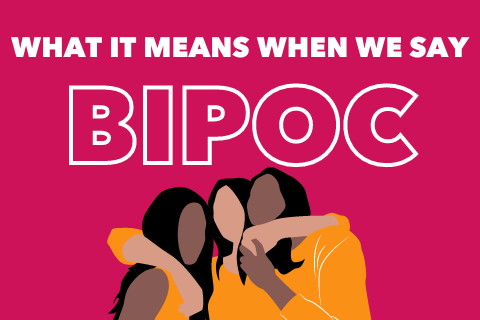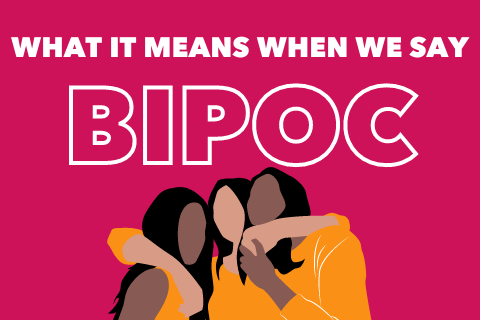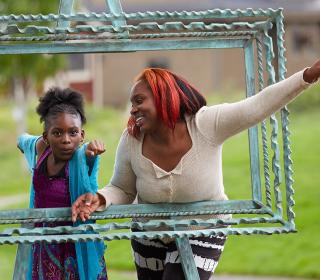DEFINITION
BIPOC stands for Black, Indigenous, and people of color. Pronounced “bye-pock,” this is a term specific to the United States, intended to center the experiences of Black and Indigenous groups and demonstrate solidarity between communities of color.
WHY
The term “BIPOC” is more descriptive than people of color or POC. It acknowledges that people of color face varying types of discrimination and prejudice. Additionally, it emphasizes that systemic racism continues to oppress, invalidate, and deeply affect the lives of Black and Indigenous people in ways other people of color may not necessarily experience. Lastly and significantly, Black and Indigenous individuals and communities still bear the impact of slavery and genocide.
BIPOC aims to bring to center stage the specific violence, cultural erasure, and discrimination experienced by Black and Indigenous people. It reinforces the fact that not all people of color have the same experience, particularly when it comes to legislation and systemic oppression.
USAGE
Here’s some examples of how we use BIPOC in YWCA messaging:
- YWCA is dedicated to ensuring women in our community, especially BIPOC women, have the opportunity to build a safe, healthy, and stable life of their choosing.
- The impacts of historic injustice have continually pushed BIPOC communities further from opportunity, creating barriers to their success, safety, and well-being.
- We must work together to tackle the economic, housing, and health injustices that make it harder for women, particularly BIPOC women, to thrive and lead.
BIPOC does not replace naming Black people and should not be used when referring to an individual or an issue that affects a specific group of people. When in doubt, be specific. For example:
- From education and healthcare to pay and housing, women feel the impact of systemic and structural inequity in their daily lives, particularly Black women.
- Women still are paid just 82 cents for every dollar paid to a man. Black women earn just 63 cents, and Latinas earn 55 cents compared to what white men earn.
- The coronavirus pandemic is taking an especially heavy toll on the Latinx and Black communities, from high rates of unemployment to increased risk of infection.
Remember, there is no “one size fits all” language when it comes to talking about race. Language is crucial, but it isn’t the answer. The term BIPOC is simply a tool to frame a broader discussion for collective action on issues of race and gender in our community.
Stay Engaged in Anti-Racism Work
Join YWCA Seattle | King | Snohomish and Town Hall Seattle on Friday, April 26 for an afternoon discussion about the past, present, and future of social justice activism on a local, national, and international scale. This virtual event is FREE, but registration is required.
This year’s theme is Sankofa: Looking to Our Past as We Build our Future.
Hear from featured speaker Elmer Dixon (Activist and Co-Founder of the Seattle Chapter of the Black Panther Party) as well as a panel of community leaders. Register today!
Resources & Articles
To learn more about this term and its origins, see articles and resources listed below.
The BIPOC Project
We use the term BIPOC to highlight the unique relationship to whiteness that Indigenous and Black (African Americans) people have, which shapes the experiences of and relationship to white supremacy for all people of color within a U.S. context.
What does the acronym BIPOC mean?
Changing terminology alone won’t change the systems or culture that uphold white supremacy, but making the conscious effort to be more inclusive in your language can help contribute to a world that is more accepting of diversity and supportive of racial justice.
What does BIPOC stand for? Why it’s important you know what that phrase means
It is important to acknowledge that no one term is going to be embraced by every member of a community. While many people are widely using the term “BIPOC,” others dislike it, and what people want to be called is very much a matter of personal preference. This difference plays into whether to use “Black” or “African-American,” too.
Why the term “BIPOC” is so complicated, explained by linguists
In the 1960s and ’70s, “groups like the Black Panther Party for Self Defense and the Brown Berets came together in solidarity as people of color, which was a new instantiation of the idea of people having color.” The new solidarity term used person-first language, as opposed to the idea of “colored people,” meaning Black people, that emerged in the late 19th century.
We share the stories of our program participants, programs, and staff, as well as news about the agency and what’s happening in our King and Snohomish community.



